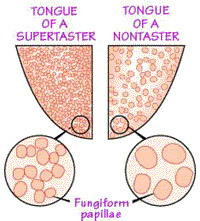 What did I learn from Mike Steinberger’s three-part series at Slate about sensory perception and tasting wine?
What did I learn from Mike Steinberger’s three-part series at Slate about sensory perception and tasting wine?
Probably more if I had I wanted to dive into the science. Give him credit was not being afraid to get geeky. This was a serious investigation into tasting physiology, but in a tongue-in-cheek (yes, tongue) way that meant his ears were surely burning when we read it. Who is this guy who thinks he is a supertaster, and why should we be impressed by his über wine-tasting skills?
For me, he confirmed what I already knew: You, me, we don’t want to be supertasters, Super Tasters, or whatever you want to call somebody with an abnormal number of taste buds. I first read about concept in Elin McCoy’s Emperor of Wine, her biography of wine critic Robert Parker.
Sounds cool doesn’t it, to be super when it comes to tasting? But do you think this is what sets Parker apart? After all, he had is nose insured for a million dollars, not his tongue. What’s amazing is his ability to taste, blind, a wine he had 20 years ago and tell you what it is. Makes your realize there is as much happening in his brain as his nose or his mouth.
Fact is that supertasters experience flavors, and sensations on the tongue, more intensely. Chiles? Maybe not such a good idea. Hoppy beers? More bitter than Sam Calagione intended. Artichokes? No way. Gee, you’d be looking over your shoulder every time you dipped your bread in olive oil.
Does that sound like fun to you?
Then there is the other question. As scientists learn more about the relationship between nose and taste is there the chance they will find that our perceptions are so individual that looking to others for recommendations has little value?
All of which raises, for wine writers, a truly buzz-killing possibility: Is there a grand fallacy at the heart of what we do? Those of us who review wines do so in the belief that our evaluations, while obviously subjective, are of some value to consumers. But a growing body of scientific evidence suggests that taste perceptions may be even more individualistic and idiosyncratic than previously imagined — and if our noses and tongues all operate on such different wavelengths, then who’s to say what’s good or bad? Is it really possible to agree about the attributes and virtues of, say, a Napa Cabernet, or are we — wine writers and wine consumers — just conning ourselves into consensus?
Might we not say the same about beer?
A chosen few? No, I personally think flavor appreciation can be learned and cultivated. On the other hand, reading about such individual and idiosyncratic tasting perceptions is pretty revealing. Makes me wonder if the less-than-supertasters can talk on a more similar level. We perceive ceratin characteristics, but maybe not to such a heightened level as Parker or Steinberger?
Then again, I’ve recently noticed that super-hopped beers are becoming more repugnant and unpleasant to my palate — maybe I’m learning and developing too much! 😉
But I suppose that could be a badly blended recipe too — uh oh, another factor to contemplate!